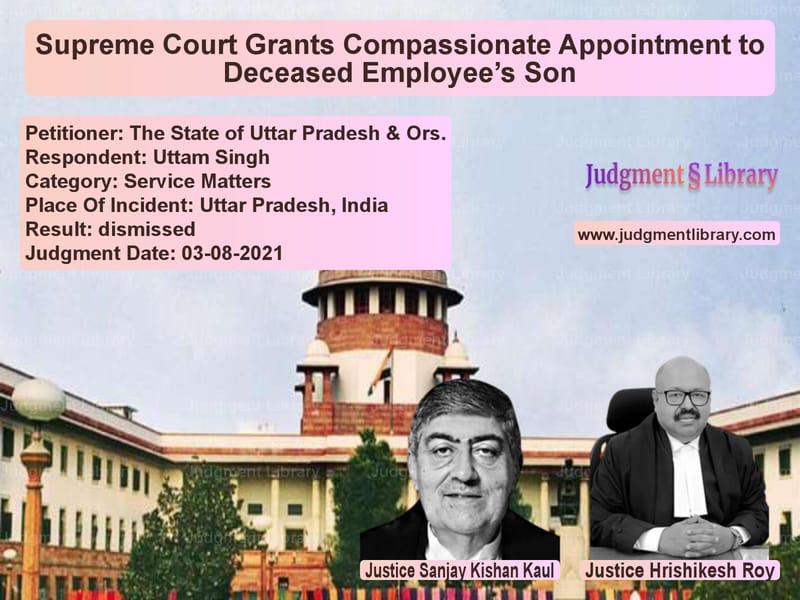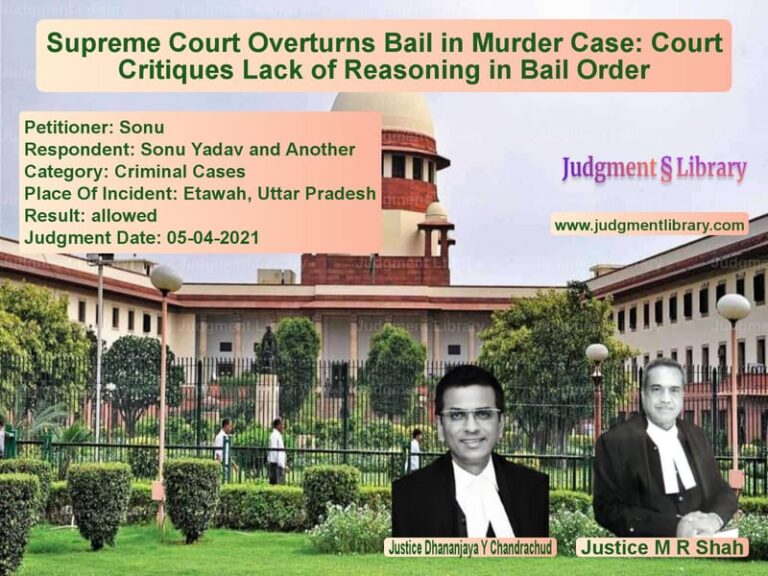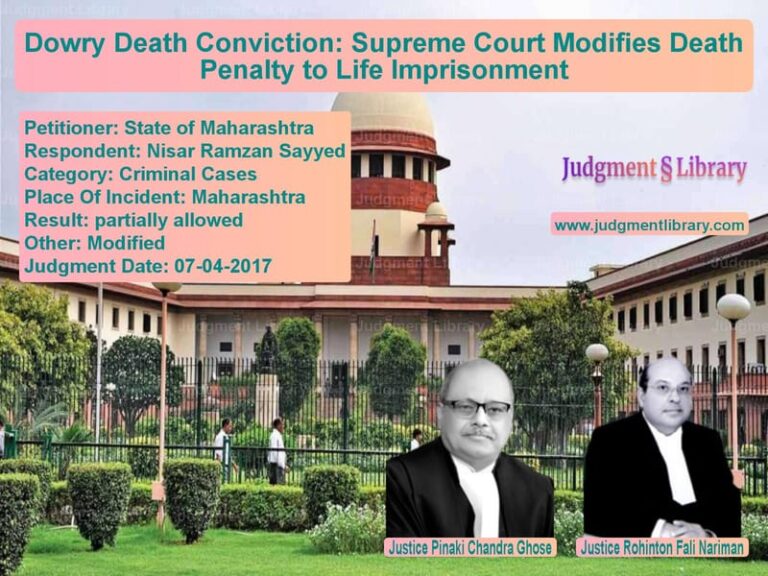Supreme Court Grants Compassionate Appointment to Deceased Employee’s Son
The case of The State of Uttar Pradesh & Ors. vs. Uttam Singh revolves around the right to compassionate appointment under the Uttar Pradesh Recruitment of Dependents of Government Servants Dying in Harness Rules, 1974. The Supreme Court was tasked with deciding whether the son of a deceased employee, who was designated as a “part-time” tubewell operator but performed regular duties, was entitled to compassionate appointment under the Rules.
The appeal was filed by the State of Uttar Pradesh challenging the judgment of the Allahabad High Court, which had ruled in favor of granting the benefit of compassionate appointment to the respondent, Uttam Singh, whose father was employed as a tubewell operator in the Irrigation Department.
Background of the Case
The dispute arose when Uttam Singh, the son of a deceased government employee, sought compassionate appointment under the Rules after his father passed away while in service. Key facts of the case include:
- The father of the respondent was engaged as a “part-time” tubewell operator in the Irrigation Department.
- He worked continuously for 13 years and was paid a salary equivalent to a regular pay scale.
- He was transferred multiple times and even appointed as a polling officer by the State Election Commission.
- Despite performing duties similar to regular employees, he was denied the status of a “regular employee.”
- After his death, his son, Uttam Singh, applied for a compassionate appointment but was denied on the ground that his father was not a “regular government servant.”
- Uttam Singh filed a writ petition, which was allowed by the Allahabad High Court, directing the state to grant him the benefit of compassionate appointment.
- The State of Uttar Pradesh appealed to the Supreme Court, arguing that the respondent was not entitled to the benefit under the Rules.
Petitioner’s Arguments
The State of Uttar Pradesh argued that:
- The deceased was not a “regularly appointed” government servant and was merely a “part-time” tubewell operator.
- According to the Rules, only dependents of “regular government servants” were eligible for compassionate appointment.
- The deceased’s appointment was never regularized, and his salary was granted only under the principle of “equal pay for equal work,” which did not imply regular status.
- The High Court had misinterpreted the Rules and granted relief based on an erroneous interpretation.
- Granting compassionate appointment to the respondent would set a precedent for other “part-time” employees to claim similar benefits.
Respondent’s Arguments
Uttam Singh, the respondent, argued that:
- His father worked continuously for 13 years in a regular position and was paid as a regular employee.
- His father’s employment was never terminated or discontinued, which implied he was working in a “regular vacancy.”
- The government treated his father as a regular employee by transferring him across departments and assigning him election duties.
- Other similarly placed employees, including one “Balram” and “Smt. Geeta Devi,” were given the benefit of compassionate appointment.
- The denial of his application was discriminatory and possibly due to previous litigation between his father and the Irrigation Department.
- The definition of “government servant” under the Rules includes those who have worked continuously for three years in a regular vacancy, which applied to his father.
Key Legal Issues
The Supreme Court examined the following issues:
- Whether the deceased employee was a “government servant” under the Rules despite being designated as “part-time.”
- Whether compassionate appointment could be granted to the dependent of a “part-time” employee who worked continuously and was paid a regular salary.
- Whether the decision of the Allahabad High Court was in accordance with legal precedents on compassionate appointments.
- Whether the state had acted in a discriminatory manner in denying the benefit to the respondent while granting it to others in similar positions.
Court’s Observations
The Supreme Court made several significant observations:
1. Definition of “Government Servant”
The Court examined Rule 2(a)(iii) of the Rules, which states that a government servant includes someone who, “though not regularly appointed, had put in three years of continuous service in a regular vacancy.”
“Since the deceased had worked continuously for 13 years in a regular position and received regular pay, he qualified as a government servant under the Rules.”
2. Nature of Employment
The Court rejected the state’s argument that the deceased was “part-time” and not eligible for benefits.
“When an employee is continuously engaged in service for over a decade and is given regular pay, it cannot be said that he was merely a part-time worker.”
3. Discriminatory Treatment
The Court noted that two other individuals in similar positions had been granted compassionate appointment, making the rejection of the respondent’s claim arbitrary.
“The state cannot adopt a pick-and-choose policy when implementing service benefits.”
4. Transfers and Election Duties
The Court observed that the deceased had been transferred between departments and assigned polling officer duties under the Representation of People Act, 1951.
“Such duties are entrusted only to regular government employees, reinforcing the deceased’s status as a government servant.”
Final Verdict
The Supreme Court dismissed the appeal and ruled:
- The deceased employee qualified as a “government servant” under the Rules.
- The respondent, Uttam Singh, is entitled to compassionate appointment under the Uttar Pradesh Recruitment of Dependents of Government Servants Dying in Harness Rules, 1974.
- The state must issue necessary appointment orders within one month.
- The Court imposed costs on the state for its arbitrary conduct.
Implications of the Judgment
This ruling has significant implications for employment law and compassionate appointment policies:
- Expanding the Definition of “Government Servant”: Employees who continuously work in a regular vacancy, even if designated “part-time,” are entitled to service benefits.
- Preventing Discrimination in Employment Benefits: The ruling prevents state authorities from selectively applying rules to grant or deny compassionate appointments.
- Strengthening Employee Rights: The judgment reinforces that workers receiving regular pay for continuous service cannot be denied benefits by labeling them “part-time.”
- Ensuring Fairness in Public Sector Employment: The decision ensures that government employees’ dependents are not unfairly deprived of their rights.
Petitioner Name: The State of Uttar Pradesh & Ors..Respondent Name: Uttam Singh.Judgment By: Justice Sanjay Kishan Kaul, Justice Hrishikesh Roy.Place Of Incident: Uttar Pradesh, India.Judgment Date: 03-08-2021.
Don’t miss out on the full details! Download the complete judgment in PDF format below and gain valuable insights instantly!
Download Judgment: the-state-of-uttar-p-vs-uttam-singh-supreme-court-of-india-judgment-dated-03-08-2021.pdf
Directly Download Judgment: Directly download this Judgment
See all petitions in Employment Disputes
See all petitions in Public Sector Employees
See all petitions in Pension and Gratuity
See all petitions in Recruitment Policies
See all petitions in Termination Cases
See all petitions in Judgment by Sanjay Kishan Kaul
See all petitions in Judgment by Hrishikesh Roy
See all petitions in dismissed
See all petitions in supreme court of India judgments August 2021
See all petitions in 2021 judgments
See all posts in Service Matters Category
See all allowed petitions in Service Matters Category
See all Dismissed petitions in Service Matters Category
See all partially allowed petitions in Service Matters Category







